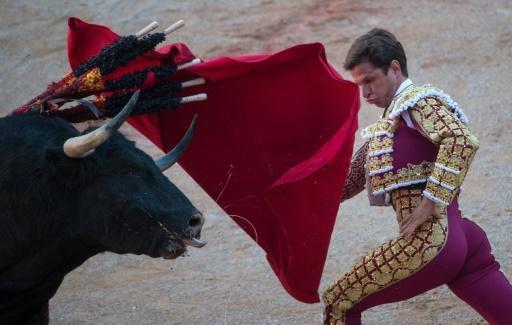Tensions over bullfighting are growing in Spain, where the death of a matador in the ring broadcast live on television has added fuel to a national debate over the centuries-old but controversial tradition.
Animal rights activists renewed calls for a total ban on bullfighting after Victor Barrio, 29, was gored in the thigh and chest during a bullfight in the eastern town of Teruel on Saturday.
Many took to social media to celebrate Barrio’s death, the first for a matador in the ring since 1985. The critics also hurled online insults at his widow, Raquel Sanz, who wrote on Twitter that her husband had lost his life in “glory”.
Conservative Prime Minister Mariano Rajoy, who had paid tribute to Barrio after his death, on Wednesday condemned the outpouring of hate for the late matador, calling the insults “barbaric”.
Earlier this month dozens of semi-naked animal rights activists daubed themselves with fake blood and stood outside of Pamplona’s bullring, one of the biggest in the world, to protest against the start of the week-long San Fermin bull-running festival which wraps up Thursday.
Years of similarly dramatic protests preceded the regional government of Castilla y Leon’s ban in June of killing of bulls at town festivals, in a move that targets the northern region’s controversial Toro de la Vega festival where horsemen chase a bull and spear it in front of onlookers.
The centuries-old event, which takes place in the heartland of conservative Spain, had drawn increasing protests in recent years, with demonstrators turning up and taking to Twitter to denounce what they feel is an anachronistic national tradition.
Matadors are ‘heroes’
“We succeeded in positioning all of Spanish society against this celebration,” said Silvia Barquero, president of Spain’s animal welfare party PACMA which won nearly 285,000 votes in a June 26 general election, a record for the 13-year-old formation.
But supporters of bullfighting, known as “aficionados”, are not giving up without a struggle. They see bullfighting as an art that is an integral part of Spanish culture, like flamenco.
Spain’s first pro-bullfight lobbying group, the Bull Foundation, made up of breeders, matadors and “aficionados”, was set up last year.
Protest rallies in favour of the controversial past-time have been held, such as one in the eastern city of Valencia, a major bullfighting city, which drew thousands of people in March.
Rajoy’s Popular Party government voted to attach “national cultural interest” status to bullfighting in 2013, granting the industry staunch legal protection.
Bullfighting is “the culture of our people”, said Diego Sanchez de la Cruz, a financial journalist and co-founder of La Economia del Toro, an independent platform that conducts economic analyses of bullfighting.
Matadors are “heroes, capable of fighting, again and again, animals that weight 500 kilos (1,100 pounds)”, he added.
For their part in this long-running national debate, animals rights activists disagree with the practice’s place in their culture, seeing matadors as “torturers”.
“We can hide behind words like culture, art, ritual, but in practice it’s a bull that we stab with banderillas and a sword, that we kill and torture,” said PACMA spokeswoman Laura Duarte.
There are some signs of growing political will to stop bullfighting. New far-left party Podemos, which came in third place in last month’s polls, is against it.
Following municipal elections in May 2015 several cities where the party won power such as Madrid and A Coruna in the northwest have pulled public funding for bullfighting events or stopped including bullfights as part of their annual fiestas.
Bull spectacles are expected to be banned later this year on Spain’s Balearic Islands in the Mediterranean which is ruled by a coalition including Podemos.
The move comes six years after northeastern Catalonia became the first region on mainland Spain to ban bullfights.
Valencia, Spain’s third largest city, banned the tradition of setting bulls loose with lighted torches attached to their horns called “bous embolats”.
The city’s councillor for culture, Gloria Tello, said the practice was “abuse” and an “aberration that violates animal rights”.
Opponents of bullfighting point with pride to culture ministry figures that show the number of events involving bulls fell to 1,736 in 2015 from 2,290 in 2011.
Source: AFP











